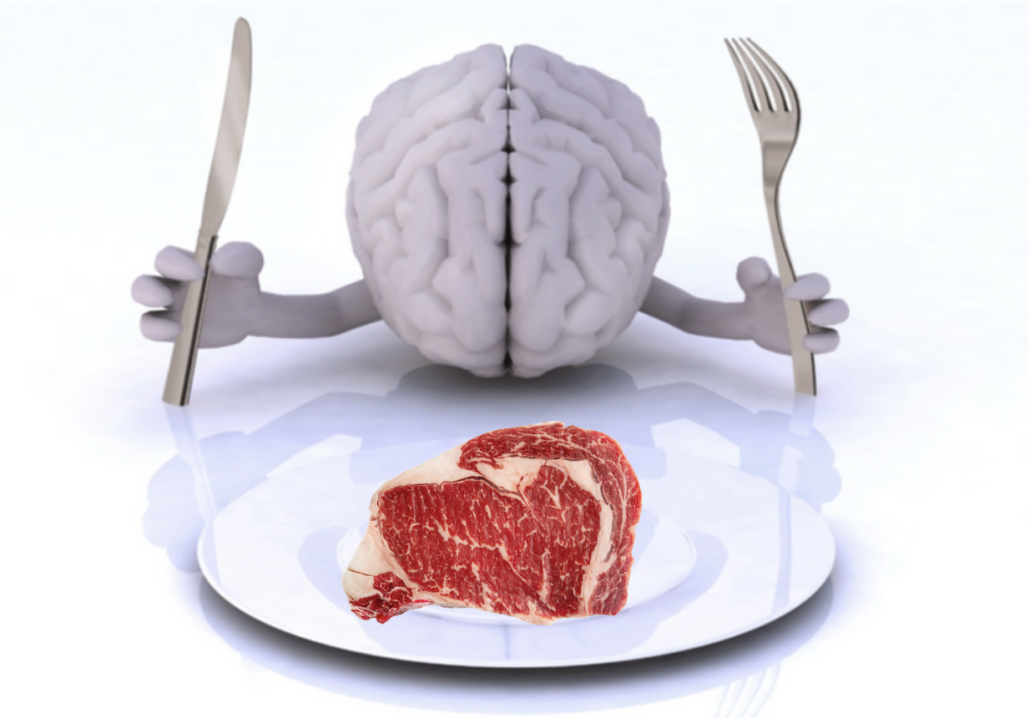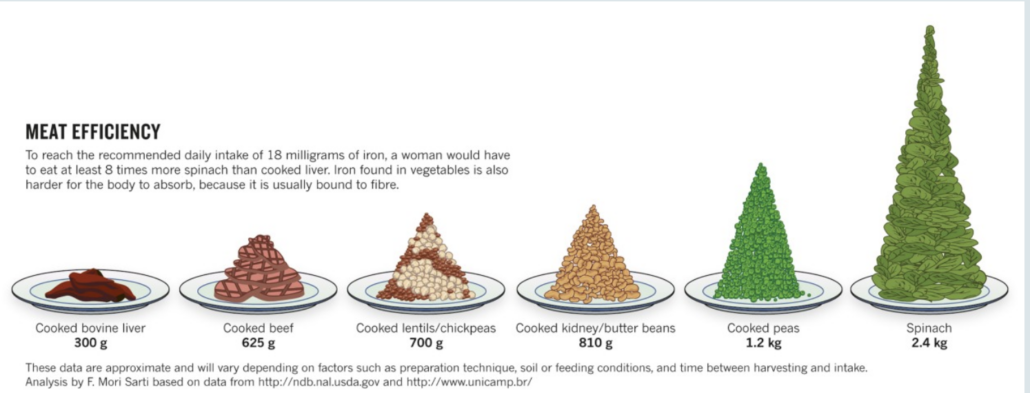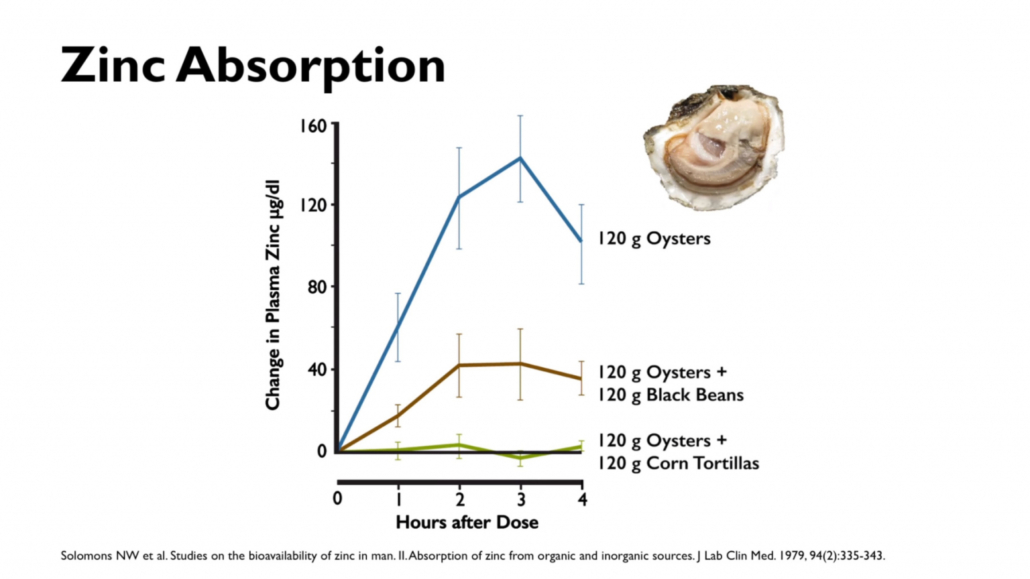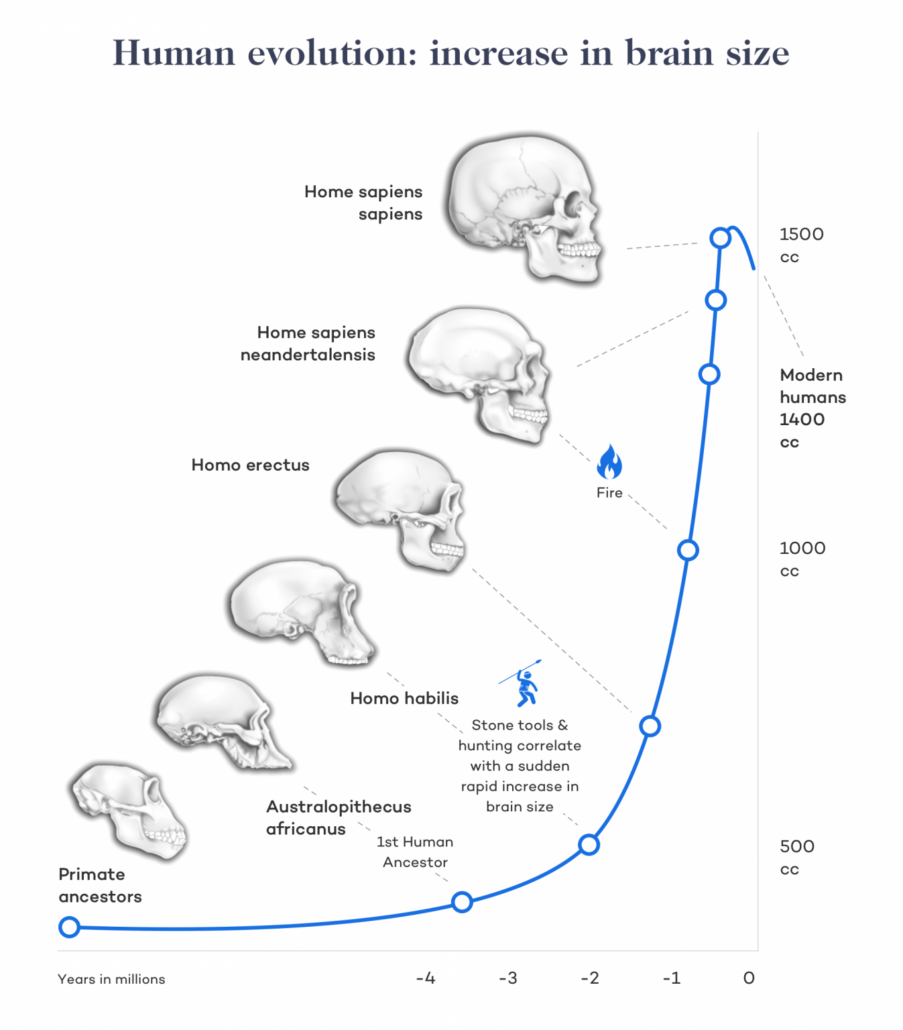We include products in articles we think are useful for our readers. If you buy products or services through links on our website, we may earn a small commission.
Top 6 Brain Foods: Based on Science Not Dogma

The brain is a particularly hungry organ, demanding 20 percent of your body’s total energy. It also requires a special blend of nutrients like B vitamins, zinc, iron, vitamin K2, complete proteins, and healthy fats. These special brain-boosting nutrients only come from certain nutrient-dense animal foods.
In this article, we will eliminate the dogma and follow the science to the top 6 true brain foods and how they can benefit our cognitive function and overall brain health.
Table of Contents
What Makes a Brain Food and Brain Food
You’ll likely find many lists of so-called “brain foods” touting a “balanced diet,” calling for a mixture of grains, berries, leafy greens, and fish. However, those lists are based on dogma, not on science.
Plant foods like leafy greens and blueberries are not true brain foods. They provide paltry amounts of nutrients per weight and offer little of the various nutrients that are vital to brain health.
For a food to truly be called a “brain food,” it has to fit a few important criteria. Let’s explore.
Brain Foods Must Be “Nutrient-Dense”
Brain foods provide brain-specific nutrients in remarkably dense formats. In other words, lots of nutrients per weight.
For example, If there were a multivitamin that contained the same 21 essential minerals and vitamins that a ribeye has, it would be the size of a tennis ball and taste infinitely less delicious.
The most nutrient-dense foods are animal products like meat, eggs, seafood, and dairy products. At the same time, concentrations of essential nutrients in plant foods are limited.
For example, 2,400 grams of spinach provides as much iron as 625 grams of beef or 300 grams of liver.

Source: Gupta, S. Brain food: Clever eating. Nature 531, S12–S13 (2016)
Brain Foods Must be Free of Antinutrients
Many plant foods like legumes and grains contain antinutrients, including:
These antinutrients can bind to important brain-specific nutrients like zinc and iron, causing deficiencies that can negatively impact cognition and brain development.

Brain Foods Must Provide Bioavailable Nutrients
Although various plants may contain some brain-specific nutrients, they occur in lower quantities and often in forms that are difficult for the body to use in any significant way.
For example, the vitamin A in carrots is actually a precursor “carotene” that the body must process into a useable version.
On the other hand, the vitamin A in animal products, “retinol,” is much more readily useable by the body.
Studies show that the body can absorb around 30% of dietary retinol one hour after eating. While carotenoids from plants were less than 5% absorbed in the same time period.8 And 45% of people lack the gene to synthesize carotenoids into useable vitamin A–meaning it’s useless for nearly half of humans.
There are similar disparities with zinc, iron, and vitamin K, leading scientists to coin the term “meat efficiency.”
Brain Foods Must Provide Brain-Specific Nutrients
For a food to honestly be labeled a “brain food,” it must provide an abundance of brain-specific nutrients. These include
- Complex amino acids (proteins): The brain uses amino acids, including tryptophan, tyrosine, and histidine, in the synthesis of various neurotransmitters and neuromodulators critical to proper brain development and cognitive processing.
- B vitamins: B12, B3, folic acid, and B6 lower levels of homocysteine in the body, potentially slowing mental decline. It is also shown to prevent depression and various other psychiatric disorders.
- Zinc: A powerful antioxidant that helps reduce oxidative stress and inflammation associated with neurodegeneration, immunologic disorders, and aging.
- Choline: plays a key role in critical brain processes, including neurogenesis, neuronal differentiation, myelination, and synaptogenesis.
- Vitamin D: Higher levels of vitamin D are associated with superior cognitive function, better memory, and slower progression of cognitive decline
- Vitamin K2: Supports brain health, reduces inflammation, supports mood, and may even reverse age-related cognitive decline.
- Vitamin A: plays an essential role in the development of the central nervous system and associated neurogenesis in the developing child. Also essential to maintaining many adult brain functions influencing neuroplasticity and specific brain structures.
- Iron: critical to various brain processes including, myelin generation, mitochondrial function, synthesis of ATP and DNA.
- Selenium: a critical antioxidant trace element that can reverse the cognitive damage of stroke and boost learning and memory in aging brains.
- Copper: This is essential for brain health. It is needed to synthesize various enzymes used for cellular respiration, turning nutrients into energy that feeds the brain, the synthesis of neurotransmitters, iron metabolism, gene transcription, and antioxidant defense. It has been shown to protect against Alzheimer’s and cognitive decline.
- Fatty Acids: arachidonic acid, docosahexaenoic acid, and eicosapentaenoic acid are essential for brain development and function.
Modern research tells us exactly what the brain needs to thrive, and not surprisingly, these nutrients are found in their greatest density and bioavailability in animal products like meat, organ meats, shellfish, and dairy.
Brain Foods Are Part of Our Evolutionary Diet
True brain foods are those that have fed the human brain since the dawn of our species.
In fact, it was these nutrient-dense animal products that gave our pre-human ancestors the brain-specific nutrients needed to fuel the rapid brain growth and separated us from other great apes.
In other words, these brain foods made us human!

1. Eggs
Eggs are a bonafide superfood with all the nutrients needed to create a living creature from scratch.
Not surprisingly, many of these foundational nutrients directly benefit brain development and maintain cognitive health.
For example, the choline and lecithin in eggs are substrates that the body uses to synthesize the neurotransmitter acetylcholine, which has been shown to improve learning memory.
While the combination of healthy fats, complete high-quality proteins, and an abundance of vitamin D, and vitamin K all make eggs the king of brain foods.
It’s worth highlighting, however, that eggs from pasture-raised hens have significantly more nutrients than their conventionally produced counterparts.
And be sure to eat the yolk–most of the micronutrients in eggs are found there. If you’re interested in the healthiest ways to cook your eggs, read more here.
| Brain-Specific Nutrients | Amount Per 100 grams (2 eggs) |
| Protein | 12 grams |
| Fat | 10 grams |
| Vitamin D (pasture-raised eggs) | 63%-500% if fortified |
| Vitamin K | 120 mcg (100%) |
| Vitamin B12 | 2.7 mcg (108%) |
| Folate | 47 mcg (24%) |
| Choline | 285 mg (71%) |
| Iodine | 50 mcg (34%) |
| Selenium | 23 mcg (42%) |
2. Beef Liver
Beef liver is one of the most nutrient-dense foods on earth and is often called “nature’s multivitamin.”
It’s one of the world’s most potent sources of 3 critical brain-boosting nutrients: vitamin A, B12, and vitamin K. While providing an abundance of various B vitamins and neuroprotective minerals like selenium, zinc, and iron.
| Brain-Specific Nutrients | Amount Per 100 grams |
| Protein | 20.4 grams |
| Fat | 3.6 grams |
| Vitamin A (retinol) | 4968μg (552%) |
| Vitamin K2 | 106 mcg (88%) |
| Vitamin B12 | 49 μg (2471%) |
| Vitamin B6 | 1 mg (84%0 |
| Niacin | 13.2 mg (66%) |
| Riboflavin | 2.8 mg (163% |
| Folate | 290 μg (73%) |
| Choline | 333.3 mg (76%) |
| Iron | 4.9 mg (62%) |
| Selenium | 39.7 μg (61%) |
| Zinc | 4 mg (27%) |
| Copper |
3. Oysters
Oysters are marvelous mollusks with an astounding array of vital brain-boosting nutrients.
Their combination of zinc, copper, vitamin D, vitamin B12, and selenium act as antioxidants that combat oxidative stress and inflammation in the brain.
| Brain-Specific Nutrients | Amount Per 100 grams |
| Protein | 7 grams |
| Fat | 2.5 grams |
| Vitamin D | 320 iu (80%) |
| Vitamin B12 | 19.5 mcg (324%) |
| Iron | 4.9 mg (62%) |
| Selenium | 63.7 mcg (91%) |
| Zinc | 90.8 mg (605%) |
| Copper | 4.5 mg (223%) |
4. Ribeye Steak
Ribeye steak is so nutrient-packed that it’s entirely possible to thrive on a diet of just ribeye, salt, and water. In fact, there’s a name for it, and it’s called the “Lion Diet.”
Ribeye steak nourishes your brain with an abundance of healthy fats, proteins, and vital minerals in arguably the most delicious format anywhere.
| Brain-Specific Nutrients | Amount Per 227 grams (8 oz) |
| Protein | 65 grams |
| Fat | 24 grams |
| Omega 3 fatty acids | 64 mg |
| Vitamin D | 14 mcg (70%) |
| Vitamin B12 | 3.4 mcg (142%) |
| Vitamin B6 | 17 mg (100%) |
| Vitamin B3 (Niacin) | 19 mg (119%) |
| Vitamin B1 (Thiamin | .3 mg (25%) |
| Folate (B9) | 26 mcg (7%) |
| Riboflavin | .3 mg (23%) |
| Choline | 170 mg (31%) |
| Iron | 5 mg (68%) |
| Selenium | 72 mcg (131%) |
| Zinc | 12.2 mg (111%) |
| Copper | .3 mg (33%) |
5. Blue cheese
Blue cheese is one of the most underrated brain foods thanks to brain-boosting fats, proteins, and thousands of beneficial bioactive peptides produced by the ripening process.
Recent studies have revealed that varieties of blue cheese contain between 2900 and 4700 different bioactive peptides produced as enzymes break down dairy proteins.
In one study, researchers examined the dietary data of 1,787 people between the ages of 46 and 77 to find out which dietary changes were linked to the prevention of age-related cognitive decline. The researchers determined that by far, cheese was the most protective food against age-related cognitive decline.
While a 2018 study found that blue cheese has neuroprotective properties and that eating cheeses rich in bioactive compounds protects against neurodegenerative disorders.
Similar findings from a 2021 study published in the Journal of Alzheimer’s Disease linked eating cheese with improved cognition as we age.
One of the most powerful and well-studied peptides in blue cheese is called spermidine. This compound has been found to reduce inflammation, increase memory cell formation, and trigger a process of autophagy that removes toxic protein aggregates in cells. These toxic cell parts are linked to neurodegeneration, dementia, Parkinson’s, and Alzheimer’s.”
| Brain-Specific Nutrients | Amount Per 100 grams |
| Protein | 13.3 g |
| Fat | 43.3 g |
| Omega 3 fatty acids | 75 mg |
| Vitamin B5 | 1.7 mg (35%) |
| Vitamin B2 | 0.4mg (36%) |
| Selenium | 8.6µg (16%) |
| vitamin K2 | 36 mcg (30%) |
| Spermidine | 262 nmol/g |
6. Salmon
Salmon is loaded with high-quality protein, healthy fats, including omega-3s, and a complex of B vitamins.
However, if you want to get the greatest nutrient benefits, select wild coho or king salmon. For example, a 100-gram serving of farmed salmon provides a decent 66% of your RDV of vitamin D. The same size serving of wild salmon provides around 160%.
On the other hand, farmed salmon has higher levels of omega-3 fatty acids, but it can come with an environmental cost and lower levels of other important nutrients.
| Brain-Specific Nutrient | Amount per 100 grams. |
| Protein | 20g |
| Fat | 12g |
| Omega-3 fatty acids | 780-1800 mg (120-300%) |
| Vitamin B12 | 7.4µg (308%) |
| B3 | 8.4mg (53%) |
| B6 | .3mg (21%) |
| B5 | 1gm (21%) |
| Vitamin A | 453.0IU (15%) |
| B1 | .2mg (13%) |
| B2 | .2mg (13%) |
| Vitamin D | 526-1200 iu (66-160%) |
| Vitamin E | 1.5mg (10%) |
| Selenium | 31.0µg (56%) |
| Potassium | 370.0mg (10%) |
Top 6 Brain Foods: The Bottom Line
True brain foods are loaded with brain-specific nutrients. They have been shown to support brain development in children, support cognition through adulthood, and protect against neurodegenerative disorders later in life.
Brain foods must provide brain-specific nutrients in a dense format, meaning you don’t have to eat a ton of food to get them.
They also need to come in a bioavailable format that is easy for the body to absorb. At the same time, they must be free of antinutrients that inhibit absorption.
Eggs, liver, red meat, oysters, blue cheese, and salmon fit this criterion. Not surprisingly, they have been a central part of the human diet since the dawn of our species.





















